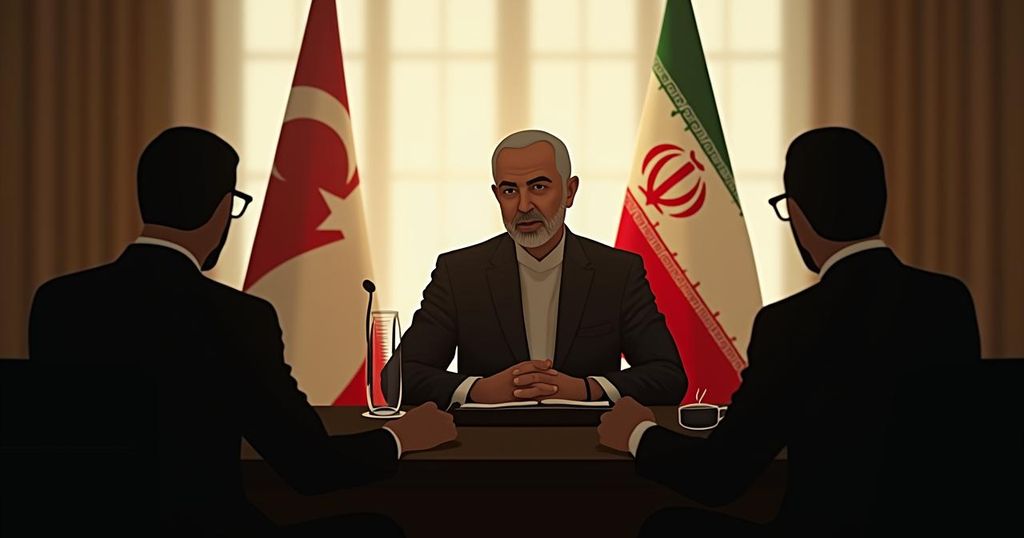Iranian Foreign Minister Abbas Araghchi’s visit to Beirut follows Iran’s missile strikes on Israel and coincides with Israeli air strikes near Beirut’s airport. Meanwhile, a summit in Doha indicates a potential thaw between Iranian and Gulf leaders, with discussions focusing on enhancing diplomatic relations amidst ongoing conflict. As casualties in Lebanon rise, the humanitarian crisis deepens, raising concerns over regional stability.
Iran’s Foreign Minister, Abbas Araghchi, arrived in Beirut on Friday amid escalating tensions following Iran’s missile attacks on Israel. These strikes occurred shortly after Israeli air raids targeted areas near Beirut’s airport and were reportedly aimed at Hashem Safieddine, a key Hezbollah figure seen as a potential successor to leader Hassan Nasrallah, who was killed in an Israeli assault on September 27. Araghchi’s agenda includes discussions with Lebanon’s caretaker Prime Minister Najib Mikati and Parliament Speaker Nabih Berri, a Hezbollah ally. Simultaneously, a summit in Doha, Qatar, brought together Iranian and Gulf leaders, signaling a potential thaw in relations between Riyadh and Tehran. Iranian President Masoud Pezeshkian expressed Tehran’s desire to improve ties with Saudi Arabia during a meeting with Saudi Foreign Minister Faisal bin Farhan. Pezeshkian stated, “We consider Islamic countries, including Saudi Arabia, as our brothers, and we emphasise the importance of setting aside differences to enhance cooperation,” reinforcing the notion of unity among Islamic nations. Bin Farhan echoed this sentiment, asserting that Riyadh is committed to resolving its differences with Tehran and fostering friendly relations. Reports indicate that the Gulf Cooperation Council members have assured Iran of their neutrality concerning the ongoing conflict with Israel. Saudi Arabia remains on high alert, particularly in light of previous attacks on its oil infrastructure. Following Iran’s extensive missile assault on Israel – cited as retaliation for the assassinations of both Nasrallah and Hamas leader Ismail Haniyeh – Israeli officials are advocating for sizable counteractions against Iranian targets including oil and nuclear sites. Iran has reportedly communicated its intent to retaliate against any aggressors, emphasizing that any assistance to Israel would be viewed as complicity. In Tehran, Supreme Leader Ali Khamenei defended the missile attacks, deeming them a justifiable response to Israeli actions in Lebanon and Gaza. Khamenei articulated, “Each and every country, each and every people have the ultimate right to defend themselves against the ultimate tyranny,” framing the conflict as a struggle against a common adversary. As the Israeli bombardments intensify, particularly in southern Beirut, fatalities have surged to nearly 1,974, with a significant number of civilian casualties. The Israeli military reports at least eight of its soldiers have died while engaging Hezbollah forces. Furthermore, Lebanon’s health minister indicated that numerous paramedics and firefighters have been killed or injured by Israeli strikes, all amidst a humanitarian crisis as shelters reach full capacity and many civilians are left homeless.
The geopolitical landscape between Iran and its neighboring Gulf states has been increasingly complex, particularly in light of the protracted Israel-Palestine conflict. The intensity of military actions from both Iran and Israel has prompted diplomatic engagements among regional powers. Iran’s missile attacks on Israel represent a significant escalation in the ongoing hostilities, while Gulf leaders seek a position of neutrality to avert broader regional conflict, especially in relation to oil supply stability. Historical animosities have often complicated dialogues, but recent summits indicate a cautious approach towards improved relations, particularly between Saudi Arabia and Iran, amid the backdrop of escalating violence.
The situation in the Middle East is intensifying, marked by Iran’s military actions against Israel and diplomatic overtures to Gulf states. The potential rapprochement between Iran and Saudi Arabia, although promising, is shadowed by ongoing military conflicts. The humanitarian impact in Lebanon is severe, with escalating casualties and displacement resulting from hostilities. As dialogues unfold amidst warfare, the effectiveness of diplomacy in de-escalating tensions remains in question.
Original Source: www.middleeasteye.net






